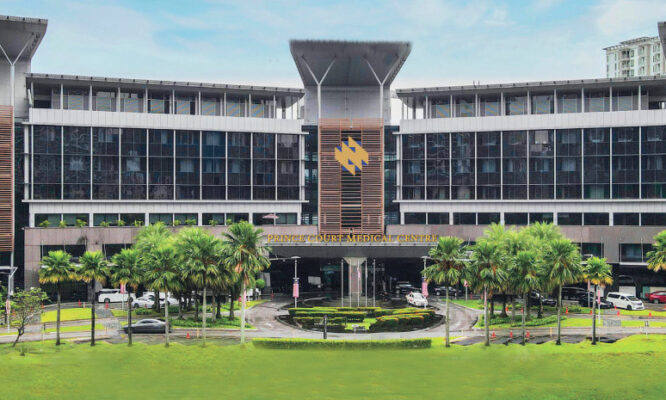With cloud computing, artificial and data analytics, healthcare is entering an exciting new phase
In partnership with TM ONE
COVID-19 is forcing a transformation in almost every aspect of our lives, and the world’s healthcare sector is no exception. The pandemic has created enormous pressure on healthcare system with hospitals around the world experiencing bed shortages, supply disruptions and staff burnout. However, this is counterbalanced by an unprecedented acceleration in the use of digital technologies during the past 20 months.
According to a recent McKinsey study, telehealth consultations are a stunning 38 times higher than in the pre-pandemic era. Furthermore, 40% of survey respondents said they would continue to use telehealth even after the pandemic, while 40–60% said they would be open to broader uses of digital technology to manage their health. And it’s not just patients. Doctors and hospital administrators are on board. Deloitte’s 2021 Global Healthcare Outlook identified that 65% of surveyed healthcare providers has embraced digital technology to improve how clinicians work, and 64% has used digital systems to engage with patients.
Unsurprisingly, investment in the digital healthcare space is skyrocketing. Rock Health’s digital health funding report for the first half of 2021 showed that venture capital investment totalled US$14.7 billion, more than all of the investments in 2020. This indicates that digital healthcare is not just a response to the pandemic, but a reality that is here to stay.
But what does digital healthcare look like on the ground? What challenges will healthcare providers encounter? What partnerships can they leverage? In Malaysia, the business-to-business arm of Telekom Malaysia Berhad (TM), TM ONE, has been supporting healthcare providers with scalable and cost-effective transitions. Read on to discover how digitalisation can enhance healthcare.

Benefits of digital healthcare
Digital healthcare extends far beyond paper-free clinics and patient-physician teleconferences. When smartly designed and implemented, streamlined digital infrastructure deploys different technologies to enhance patient care and ease clinic administration.
For example, the Internet of Things (IoT) will make it easier for the patients to monitor their own health at home, and for doctors to access patients’ records for remote consultations. IoT can also facilitate meaningful collaboration between specialists by eliminating unnecessary data silos.
Artificial intelligence (AI) can improve diagnostic accuracy in reports and scans, identify contradictions inpatient care and help specialists devise effective treatment plans.
Big data analytics can help identify health patterns not just in individual patients, but across populations and this is particularly useful when it comes to determining disease prevalence, causes and spread patterns.
On the administrative side, Blockchain technologies have the potential to reduce costs and ease the workloads by improving billing and insurance claims, simplifying supply-chain management and exchanging clinical data securely.
LEARN MORE: Are you a healthcare service provider? Book a consultation with TM ONE’s digital experts
Collaborating for success
For most medical institutions, implementing a well-designed digital roll-out is difficult to execute with in-house staff, as it involves several specialised technologies. For starters, there’s the need for a flexible, robust and scalable cloud to securely keep patient records as well as applications for diagnostics, prescriptions and billing. Furthermore, clinics and medical businesses may lack the know-how and resources to develop software-defined networks and connectivity, engaged world-class local data centres and comply with data residency rules. On top of these, digital healthcare demands proactive cybersecurity measures to ensure all sensitive data and records can be appropriately accessed by medical specialists while being protected against cyberattacks and unintentional leaks.
With so many moving parts, successful digital healthcare transformation is contingent on choosing a trusted and knowledgeable partner to help design and implement solutions tailored to each clinics, hospitals or public health systems. Once implemented, these solutions will need to be continually managed for smooth operations.

Success stories from Malaysian healthcare
Thanks to bold, forward-looking stakeholders in Malaysia, there are already several exciting success stories. Sunway Healthcare Group (SHG) recently announced a five-year RM50 million plan to adopt an electronic medical record (EMR)-integrated hospital information system (HIS) to enhance patient information management across its entire group of subsidiaries. The adroit use of the latest technologies was managed by TM, together with Health Insights Asia, who built robust cloud connectivity for SHG’s transformation. With a strategic emphasis on scalability and interoperability, the group is planning for more advances to further enhance the patient experience.
Another recent home-grown innovation, Naluri App is built on a holistic, forward-thinking premise of keeping Malaysians healthier through scalable coaching. The company says that AI and other technologies help multiply the productivity of their team of doctors, psychologists, dieticians and fitness coaches by 10–30 times.

How TM ONE can boost digital healthcare
TM ONE is a leading partner working with many of Malaysia’s government bodies, educational institutions, healthcare providers and financial organisations. Among TM ONE’s diverse services is the only Malaysia-owned cloud aggregator Cloud α, which brings together world-class providers such Amazon Web Services (AWS), Azure, Huawei, Alibaba and VMWare.
Cloud α can help run workloads of any size and complexity, and ease the collaboration between specialists, speed up decision-making and empower stakeholders operating off-site. Moreover, it is housed in TM ONE’s PCI DSS compliant, ISO/IEC 27001 and Uptime Institute Tier III certified Twin Core Data Centre, which simplifies data residency compliance and ensures low latency. All in all, these cloud services ensure that digitalising healthcare services need not begin with enormous hardware costs.
To safeguard patient trust in digital healthcare, TM ONE has in-depth knowledge of industry-specific regulations, such as Health Insurance Portability and Accountability Act (HIPAA). The TM ONE CYDEC offering provides continuous, real-time and predictive protection across private and public networks while facilitating the flow of healthcare information where needed and authorised.
Best of all, TM ONE services are professionally managed, so you will have an active partner who ensures smooth operations, training, integration with your existing systems, troubleshooting and 24/7 availability.
In the coming years, digitalisation will transform how Malaysians access medical care. Whether you’re a private practitioner, a small clinic or a large hospital, adoption of digital solutions will definitely improve cost-efficiency, employee effectiveness and most importantly patient care.
Reach out to TM ONE for a consultation on how cloud computing, cybersecurity and its other services can enhance your business.









